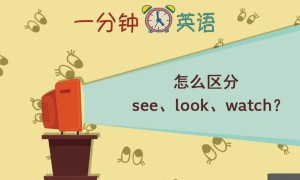各位在准备多益考试的朋友,会不会觉得某些字长得好像,总是搞不清楚它们的差别呢?
今天要带大家深入了解一个常常造成混淆的字,就是 except(除了……之外)。
首先,对于某些初学者来说,这个字和 expect(预期)长得很像,一不留神就搞错了。我们来看一个例句:
The Board might expect/except a significant increase in trading volume.
董事会可能会预计交易量将大幅增加
根据语意,我们该选用动词 expect。
再来看第二个句子:
Everyone agreed to the proposal expect/except the manager.
除了经理之外,大家都赞成该提案。
根据语意,我们该选用 except(= with the exception of)。这样大家知道 except 和 expect 的差异了吧?

另一个初学者常感到困惑的地方,就是 except 和 besides 的差异。虽然中文翻译都是 “除了……之外”,但 except 表达是例外(exception),所以以上的例句表示经理不赞成该提案。相比之下,besides(= in addition to) 表达的并非是例外,而是“附加” 的语意。比较以下例句:
Besides the manager, Peter agreed to the proposal.
除了经理之外,彼得也同意该提案。 (经理和彼得都同意该提案)
但在否定句里,besides 和 except 同义:
John talked to no one except/besides the manager.
约翰除了跟经理说话之外,没跟别人说话。
接下来细看 except的特殊用法。在句首时,只能用 Except for,而非 Except:
Except for the manager, everyone agreed to the proposal.
除了经理之外,大家都赞成该提案。
如果只用 except 表达上句的语意,就得将 except 引导的片语移至句末:
Everyone agreed to the proposal except (for) the manager.
此处的介系词 for 可以省略。然而,只有在盖括性的词语(例如 every、no、all、any、whole 等等)后面的 except for 才可将 for 省略。在下面的句子里只能用 except for:
The report was excellent except for the wording.
该报告除了措辞之外,其他部分都很出色。 (只有措辞不出色)
现在来看看一个常见词组:do nothing except+ 原形动词(= do nothing but+ 原形动词):
John does nothing except type reports every day.
约翰每天除了打报告,其他事都不做。
当 do 是现在式、过去式、原形或过去分词时,but 后的动词都是原形。但 do 以 Ving的形式出现时,but 后的动词通常用 Ving 的形式:
John spent the entire day doing nothing except typing a report.
约翰花了整天的时间打一份报告,其他事都没做。
希望大家今天对于 except 有更深入的了解,我们下回再见!







